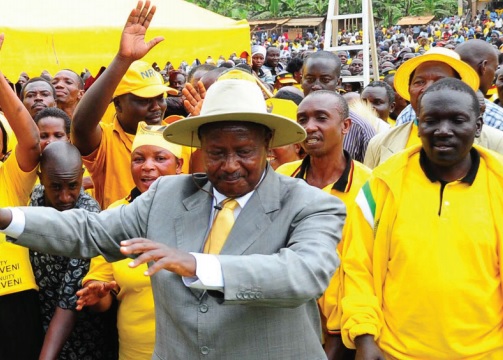
Even senior NRM party cadre, Francis Babu, who is a former minister and MP, told The Independent that now is a good time to reflect on how the NRM and Museveni’s ideological positions have evolved over the last 32 years.
He says NRM is declining in popularity because of what he calls “a lot of unfortunate changes” including Museveni’s move to recruit people from the opposition into senior government positions.
“NRM people now just sing the ideology, there is no practice. People have lost confidence in us, they are shattered. We are not serious,” he told The Independent in an interview. “We need to review the system.
Otherwise what constitutes NRM ideology today is something hazy. It needs to be resuscitated.” Babu reminisced about his time as Resis- tance Council (RC) chairman of Nakasero Village in Kampala in 1988. He described how the newly elected LCs registered all people on the village, resolved their grievances, provided security and served as the platforms of the party ideology.
“Those days if you wanted to know anything about the village, you could ask the secretary, or the chairman. Right from the grassroots, there was an ideological foundation. Now they killed it and brought Mayumba Kumi championed by crime preventers”. The Resistance Council, which later became the Local Council (LC) was the foundation of the NRM and it helped identify leaders. Through the Councils, people were elected at each level right from the villages and it was not on partisan grounds.
“The party had a good ideology when they had just captured power,” he said, “The spirit we had at the time has been killed both through legal and other means.” The Makerere University Kampala political historian, Mwambutsya Ndebesa, says by the government not conducting according to him the biggest political event of elect- ing local council representatives for more than 15 years means NRM has scored a zero on popular democracy.He said this is an important office as it’s where popular justice is delivered.
“The NRM has failed on upholding democracy, a promise they campaigned on while ascending to power,” he says. Regarding representative, Mwambutsya says the elections; even at the parliamentary and presidential level, have become a ritual held under controversy and marred by rig- ging.
“In his own party, Museveni has failed anybody who tries to stand against him. He looks at himself as the only one capable of leading this country,” Mwambutsya says. As an example, he points at the way Museveni’s former confidant and NRM party secretary General and Prime Minister Amama Mbabazi was kicked out when he expressed interests in running as a party flag bearer in the 2016 general elections.
As a result, Mwambutsya says, whoever comes up is either despised as a joker or mistreated. He cites a recent move by Workers’ MP Sam Lyomoki who announced that he would stand for presidency, and the news was portrayed as some kind of comedy.
NRM party in panic?
Lyomoki on Jan. 05 said he and others had agreed that this is the time for new Movement leaders to stand and offer cred- ible leadership for the country. He also proposed to Parliament to discuss how to handle the post-Museveni era, taking into consideration possible immunities and emoluments Museveni could be offered once he was out of power.
The increasing repression of dissenting voices, according to Mwambutsya, is a sign of panic not strength, within the ruling clique. He says the NRM Day this year “will be remembered as one that happened when the party was in panic mode after passing largely unpopular laws so they can consolidate themselves in power”.
“Museveni is panicking and aware that his party has lost popularity; that’s why he has chosen to fuse the army in all key installations. It happens at the time when they have a lot of explanations to make. Though the economy is growing, many Ugandans are still vulnerable,” he says.
He says the party has not addressed the fundamentals.
“They came to fight for freedom but they are now fighting freedom. People cannot assemble any more. There is no Ugandan bank to talk about,” he says.
According to him, 2017 was particularly challenging for the NRM when members publically showed they were against the position of the party. He speaks of the 27 members who voted no to lifting of presidential age limits and have now been summoned by the party to explain why they took that stance.
Mwambutsya warns that people’s resent- ment is mounting as the NRM continue making promises they cannot keep, starting with the Prosperity-for-all pledge which promised to improve incomes of ordinary people through the number of interventions but poverty has only been on an increase. In fact, results of the most recent survey done by Uganda Bureau of Statistics on Jan.17 show the proportion of poor people increased to 21.4% in 2016/2017 from 19.7% in 2012/13. However, party ideologues say their critics are mistaken.
“The party ideology hasn’t been watered down,” Richard Todwong, the NRM Deputy Secretary General, told The Independent, “it is only that the 10 Point Programme that they came with has been modified.” Then, like Museveni, he reeled off the four core pillars; Pan – Africanism, patriotism, social economic transformation and democracy. Todwong is one of the new NRM leaders that the old-guard like Babu spoke about. It’s not easy to see, however, whether he is merely singing the party ideology or his heart is in it.
 The Independent Uganda: You get the Truth we Pay the Price
The Independent Uganda: You get the Truth we Pay the Price


